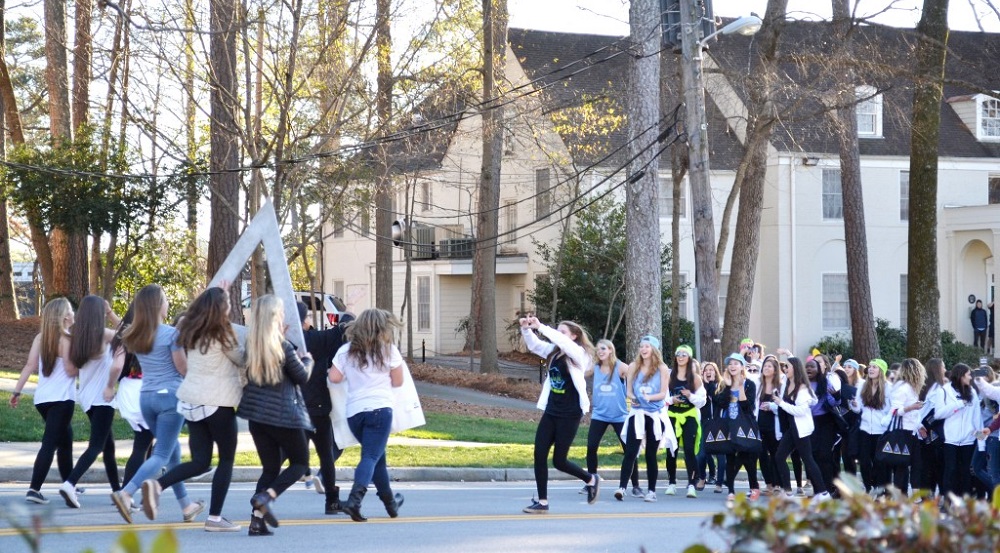While reading The Emory Wheel’s staff editorial, “Sorority Recruitment Disempowers Women,” I noticed that the editorial board did not specifically reference women who had gone through the process. I realize the piece is an editorial not designed to offer a balanced perspective to readers, so I thought I might offer the perspective of an individual who has first-hand knowledge on the subject of sorority recruitment.
I have many qualms with sorority recruitment. Is meeting with 12 girls in one sorority for two weekends a fair way to assess membership? No. Should the costs of sorority life be lowered and made more transparent? Absolutely. Should the recruitment process make a push to create a more welcoming environment for the lesbian, gay, bisexual and transgender (LGBT) community?
Hell yes. The fact of the matter is that recruitment is an inherently stressful and competitive process.
I applaud the Wheel for writing about the process and sparking a conversation. Yet, as much as I wanted to enjoy the article, I was severely disappointed by its bias and lack of objectivity. I encourage campus leaders to reevaluate our recruitment process in an objective and collaborative environment. But first, we need to clarify what the true problems are; otherwise, we will do more harm than good.
I went through sorority recruitment as a freshman in spring 2013. Before college, I never thought I would join a sorority — I do not have any family members who participated in Greek life, and the only image I had of Greek life was from the ABC show “Greek.” To say the least, drama, gossip and hazing were not activities I wanted to be a part of. However, after fall semester freshman year, my friend and I decided to spontaneously sign up the night before the online recruitment application closed.
After going through the recruitment as a potential new member (PNM) and as an initiated member, I can report with confidence that my worries about Greek life at Emory have been dispelled.
The Emory Panhellenic Council (EPC) institutes its rules and protocols to make the recruitment process as open and comfortable as possible for the women involved.
[quote_box name=””]I am a first-generation Korean American, and my sorority sisters come from all nationalities, sexual identities and ethnicities, and we are proud of this diversity.[/quote_box]
The prohibited “B” words referenced in the article are not meant to objectify or stifle Emory women. Rather, they prevent conversation that may be uncomfortable for the PNM and make it more difficult to screen new members based on their religious or political beliefs.
In addition, we want the conversations to focus on the character of the PNM rather than superficial topics like hook-ups and partying. The regulations in place help elevate the conversation.
Instead, topics vary from the values of our sorority, causes we are passionate about, television shows we enjoy and our aspirations and goals. For example, I’ve had a stimulating conversation about a nonprofit one PNM had begun when she was 16 and a delightful 15-minute conversation about how hilarious cats are.
In addition, “strict silence” is not intended to avoid crying or upset girls but to create a fairer environment for each woman involved. The fact of the matter is that recruitment takes two weekends. This provides plenty of time for gamesmanship and manipulation. Strict silence imposes stiff penalties on all unapproved communication because of the high potential for game playing. All PNMs are provided a Pi Chi (a Greek member who is Greek-neutral for the duration of the recruitment period) and are encouraged to speak with their Pi Chi if they have any emotional or psychological feelings they are dealing with because of recruitment.
The article asserts that, as a result of its recruitment process, sorority life is classist, overdependent on appearance, discriminative and disempowering. I find this to be an inaccurate indictment. In order to reduce the financial burden on members, Kappa Kappa Gamma, my sorority, offers scholarships from our national foundation, payment plans and opportunities to enroll in Special Status, a program that reduces chapter fees according to the degree of participation for members who have a demanding school-related activity such as overloading in credits or playing a varsity sport.
Further, assessing personality and character, not outer beauty, is what matters. I am a first-generation Korean American, and my sorority sisters come from all nationalities, sexual identities and ethnicities, and we are proud of this diversity.
Another contentious statement the article made was that Emory women enter sororities for male approval. Each one of us becomes involved in sorority life for our own reasons. Yes, I’m sure some women want to meet men, and so what?
It is a great institution to meet fellow students socially. But I know for a fact that most women join for the friendships, and it’s as simple as that.
In our sisterhood we watch “The Bachelor” together every Monday night in the lodge, always have someone to sit with at Cox Hall, devote our Relay for Life team to a sister whose family member is fighting cancer and always have closets to share and shoulders to lean on.
Lastly, the article suggested that fraternity recruitment is superior to that of sororities. I have never been through fraternity recruitment, but I have talked with friends who have. In my opinion, I like how open the discussions are and I see the positive aspects in the freedom their process provides. However, this leaves more room for bias and exclusiveness, since there is no structure in place that allows all PNMs to feel welcome to attend all houses unlike in the sorority recruitment process. Additionally, much of fraternity recruitment involves alcohol, bars and partying. I don’t believe those characteristics should affect how we choose new members; sisterhood goes beyond all of that.
Accepting my bid to Kappa Kappa Gamma was one of the best decisions of my undergraduate career. After two years, I can say the sisters I gained are some of the most intelligent, engaging, service-oriented and open-minded individuals that I have ever met. At Emory, they are leaders, advocates, tutors, athletes and respected students. They motivate me to be a better person every day. As we say during recruitment, our sorority does not seek to mold new members, but to inspire them to become a better version of themselves.
Elyse Lee is a College junior from York, Pennsylvania.






